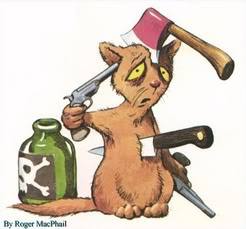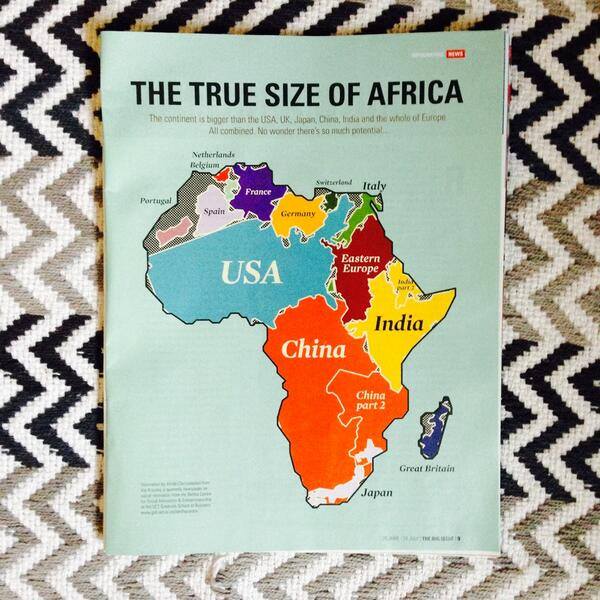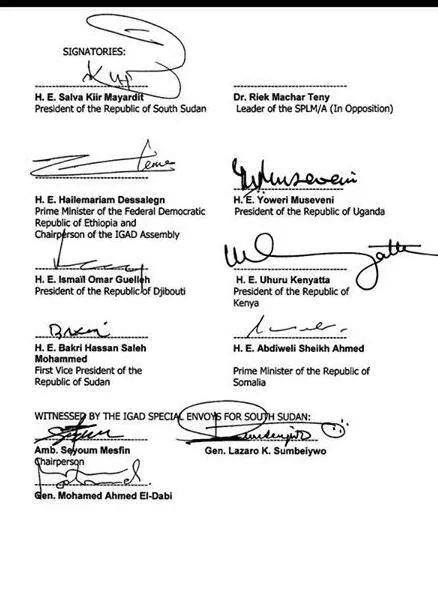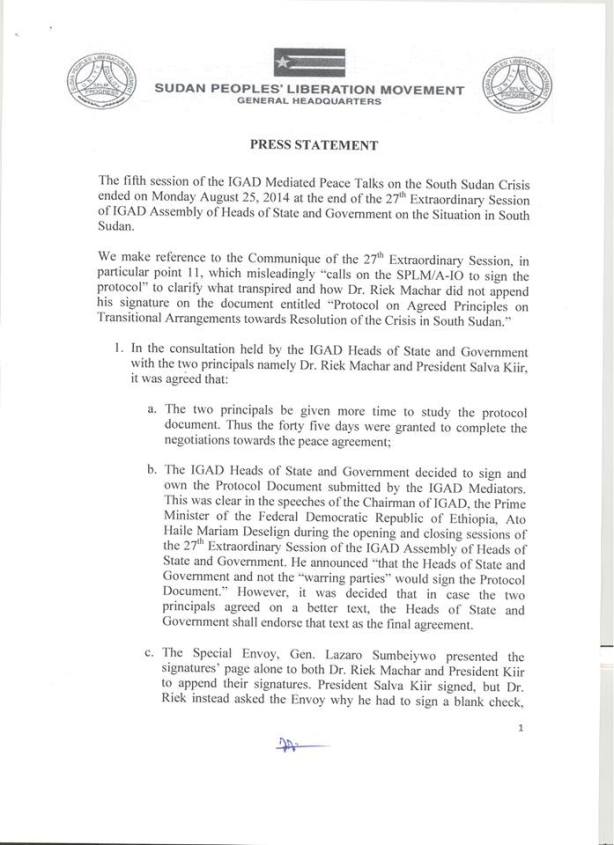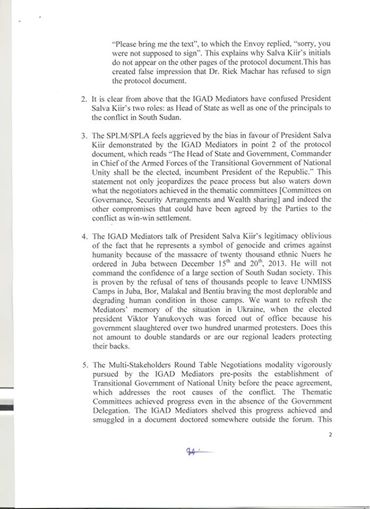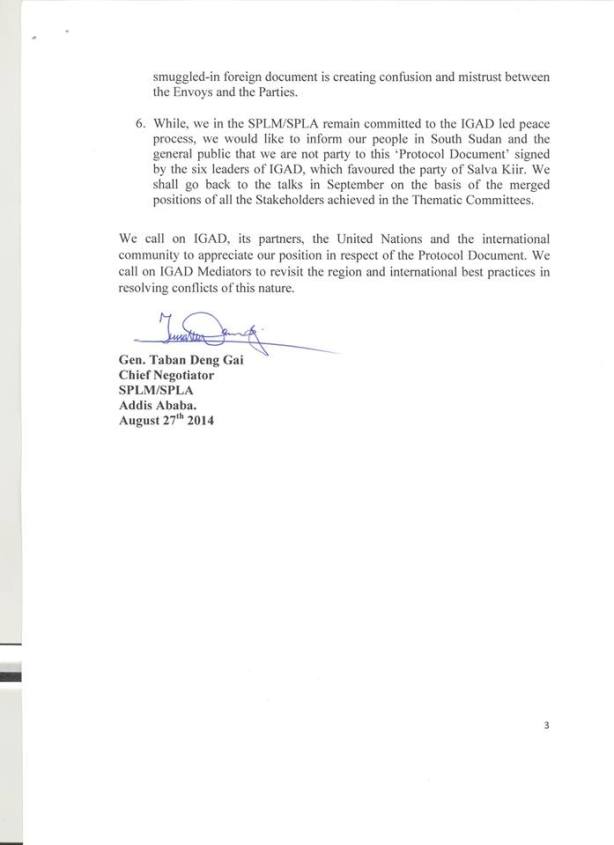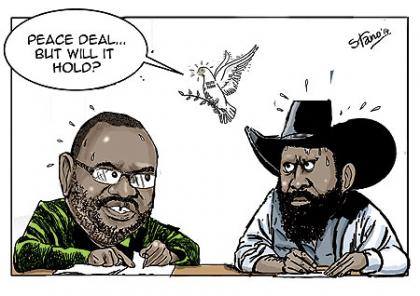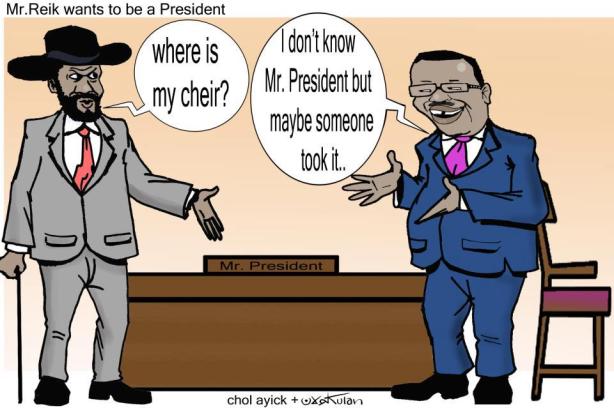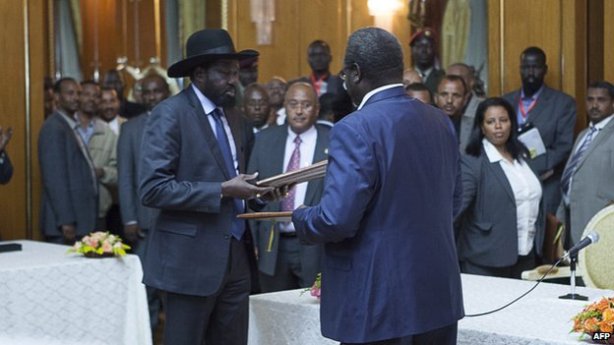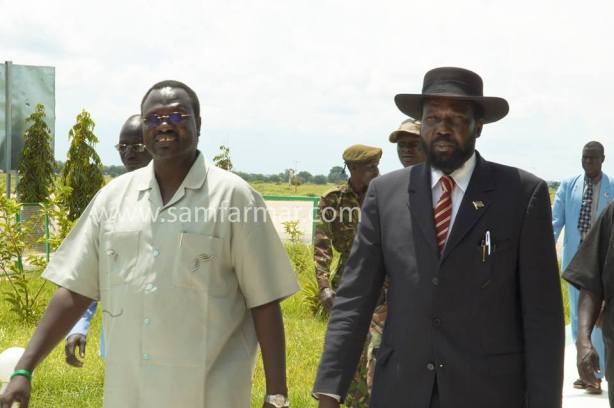PaanLuel Wël, Kampala, Uganda
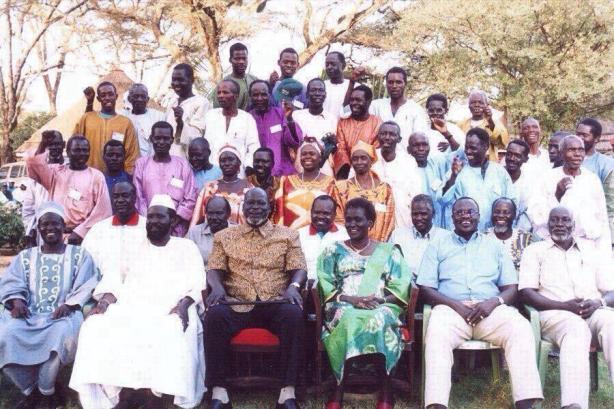
in the company of Dr. John Garang: once upon a time, we were united.
On the 30th of August, 1991, the BBC World Service and the BBC Focus on Africa Program both announced the purported ousting of the SPLM/SPLA leader, Dr. John Garang, in a military coup.
The 1991 Nasir coup was engineered by Lam Akol, led by Riek Machar and backed by Gordon Koang Chol.
The coup had been initiated two days earlier, on August 28th, but many people, both within and outside the movement/country, were not aware of it until the BBC announcement on the 30th of August.
Today mark the 23th year of that fateful announcement.
As South Sudanese are once more mired down in another self-defeating fratricidal war, it would be prudent to revisit the reasons for and against the 1991 Nasir coup.
History being the best teacher, the lessons of the 1991 Nasir coup could prove critical to the unraveling of the current politico-military quagmire in the republic of South Sudan.
Below are some of the three vital documents chronicling the coup and the arguments advanced for/against it.
The first document was the official press release from the Nasir leaders announcing the dismissal of Dr. John Garang from the leadership of the SPLM/A.
The press statement was written by Lam Akol and released in the name of Riek Machar on August 28th to all the members of the SPLM/A except Dr. John Garang, William Nyuon and Salva Kiir Mayaardit.
The three leaders, being the most senior members of the movement above Riek Machar, were dismissed, while rest of the movement were told to duly follow the directives issued from Nasir.
The BBC reporter, Colin Blane, who was invited by Lam Akol to Nasir, took the plane back to Nairobi, Kenya, and the press statement was then faxed to London, UK. This was why it took two days for the BBC to make the announcement.
The second document was Garang’s message to all the SPLM/A units following the failure of the Abuja-I talks. The document is very important because it highlighted the SPLM/A position on the question of self-determination relative to the political stance taken by the Nasir group.
Most crucially, Garang, having clarified the movement’s position on the question of self-determination, made a divinatory declaration (see part 9-B) on the fate of the Nasir leaders.
The third document,the Beden Falls Resolution No. 3, revealed SPLM/A leaders’ comprehensive assessment of and official respond to the Nasir coup leaders as per their declarations of August 28th.
The last document was Dr. John Garang’s statement at the conclusion of the peace and reconciliation process between the SPLM/A and the Sudan People Defense Forces (SPDF) of Dr. Riek Machar, January 2002, in Nairobi, Kenya.
The main relevant part of that document was the reason offered by Garang for his reconciliation with Riek Machar, the man who had, 11 years earlier, declared a military coup against him:
“So the situation as of now, as we said in the signed reconciliation document, it is our survival that is at stake. Therefore, survival itself, if nothing else, will force us to fully implement this document.”
The hope is that President Kiir and Riek Machar, both of whom were present when this statement was issued in 2002, should once more realize that—to paraphrase Garang—it is the survival of South Sudan that is at stake andtherefore, survival itself, if nothing else, will force them to fully adhere by and implement the recently unveiled transitional arrangements, leading to permanent cessation of hostilities and durable peace in the country.
*********
THE PRESS STATEMENT THAT ANNOUNCED THE NASIR COUP ON THE BBC ON August 30TH, 1991
August 28th 1991.
Top Secret: Message 299/8/91
From: Sennar To: Alpha Beta
R): Merowe, Kush, Amara, Napata, Soba, Ivory, Yormuk, and Matata
Info: All Units
A. For the last eight years, John Garang has been running the Movement in a most dictatorial and autocratic manner. He oppressed, humiliated and degraded the people and turned a popular struggle into a war-lordism and a reign of terror. A big number of the members of the Movement are under detention for many years for no reason other than differing with John Garang. A consummate liar, Garang’s deeds do not match his words and what he preaches at home and abroad are contrary to the reality on the ground. The direct result of Garang’s one-man show is a simmering discontent among the rank and file of the Movement. His megalomania and misguided policies alienated many and marginalized a wide cross section of members and potential members of the Movement. Garang was leading the Movement to doom.
B. In order to save the Movement from imminent collapse, it has been decided to relieve John Garang from the leadership of the SPLM/A. He is no longer the leader of the Movement. An interim leadership composed of the High Command members listed in this message will as of today 28/8/1991 take charge of the Movement affairs. The struggle will henceforth be waged with a clear sense of purpose to achieve equality, justice and freedom under a democratic set-up.
C. The following immediate steps shall be undertaken:
1. The interim leadership shall call and make arrangements for the holding of a convention, which will be attended by the members and sympathizers of the Movement from inside the country and abroad. The convention will discuss and adopt the policies of the Movement, define its structure and elect its leadership. The Zonal Commands are hereby directed to prepare themselves for this convention.
2. Strict adherence to the respect of human rights and the rule of law. In this respect, all those detained by Garang will immediately be released.
3. The militaristic policies of John Garang will be thrown into the waste basket. There shall be an immediate demarcation of military and civil administrations.
4. The SPLM shall give more impetus to the relief effort provided by Operation Lifeline Sudan, ICRC and other international relief agencies in Southern Sudan.
5. The SPLM together with the concerned parties shall promptly address the question of returnees who recently fled from Ethiopia and are now in Southern Sudan.
6. To strengthen and delegate necessary powers to the SRRA so that it can operate as a purely humanitarian organization.
7. The indigenous and foreign church organizations are called upon to double up their spiritual and relief activities in the SPLM-administered areas.
8. We call upon the international community to help us with the provision of education and health services to children in the SPLM-administered areas.
9. The SPLM offices abroad shall be revamped to reflect the new polices of the Movement.
10. The SPLM shall pursue a foreign policy that shall seek friendship with other countries.
11. The SPLM shall relentlessly strive to attain a peaceful settlement to the present Sudanese conflict. All options shall be kept open provided they lead to permanent peace.
12. The SPLA shall be reorganized in order to persecute the armed struggle more effectively. It shall adhere to the respect of the Geneva conventions and the international laws.
13. We appeal to all who could not join the Movement because of the misguided policies of John Garang that the doors of the Movement are now wide open for them. In particular, the Anyanya-2 and the government militias are welcome to join hands with the rejuvenated SPLA.
D. We assure all friends of the Movement that there is no split whatsoever. Whatever noises being made against the change are nothing more than a storm in a teacup and have no foundation on the ground. Like any other dictator, John Garang has surrounded himself with a coterie of opportunists, simpletons and flatterers. It will take him and them some time to realize that their dream world is at an end.
E. Finally, we reiterate that our move is for renewal and democratization within the Movement. We cannot remain behind when the winds of democracy are blowing all over Africa and the world at large.
F. All are cautioned not to victimize or persecute anybody because of previous association with dictator John Garang. However, resistance to the change must be dealt with promptly and decisively.
G. All are hereby ordered to respond to this end in writing within 72 hours. Aluta continua!
1. CDR. RIEK MACHAR TENY-DHURGON
2. CDR. LAM AKOL AJAWIN
3. CDR. GORDON KOANG CHOL
**********
DR. JOHN GARANG’S MESSAGE TO ALL UNITS OF THE SPLM/A AFTER THE FAILURE OF THE ABUJA PEACE TALKS
July 1992
From: The Chairman
To: All Units
Message 048/7/92
1. Our Abuja delegation came to brief me from July 1-4. All of you have been hearing all sorts of information over the BBC, Radio Omdurman, Radio Juba and other news media concerning the Abuja Talks. It is necessary that you are concretely briefed about Abuja.
2. There was unfortunately a lot of loose and inaccurate talk over the BBC by some members of our own delegation and this might have created wrong and false impression that the Movement had changed its principle objective, that of Southern Sudan and other marginalized areas. I want here to correct this false impression created over the media and to affirm to all units, and rank and file of the SPLM/SPLA that the Movement has not changed its position on unity of the country.
3. The position of the Movement at Abuja is that the SPLM/SPLA stands for a united Sudan with the following five parameters: secular, democratic, multi-racial, multi-religious and multi-lingual. The issue of self-determination does not come in unless and until the realization of this type of united Sudan that we stand for is frustrated by those who trade in Islam.
4. The above is what we said at Abuja and this has been our position ever since 1983. It is those who refuse a secular, democratic, multi-racial, multi-religious and multi-lingual United Sudan that could be the separatists, not the SPLM. Clearly if the Islamic Fundamentalist government of Beshir and Turabi is overthrown and replaced by those who stand for a secular constitution and freedom of religion, there will be religious tolerance and peace.
5. It is true that the issue of self-determination for the South and other marginalized areas of Kordofan and Southern Blue Nile was highlighted at Abuja more than any other time before. But this still doesn’t change our position. The end of the talks was the result of the NIF hard and intransigent position that they were not prepared to discuss secularism, a position which is objectively separatist. By rejecting any discussion of secularism, it was actually the NIF that was calling for separation at Abuja.
6. A second factor that had caused disinformation is the noise made by the Nasir group about separation for South Sudan since their abortive coup in August 1991. Many people, deliberately or innocently, have confused our highlighting of the possibility of self-determination at Abuja with the Nasir grouping’s August 1991 call for separation. There is no connection at all.
7. Our agenda for the Abuja talks was given to the Nigerian mediators and the Sudanese government in July 1991, one month before the Nasir coup and that agenda contained the possibility for self-determination if the SPLM/SPLA agenda for New Sudan as defined above becomes frustrated by NIF intransigence. The same position on self-determination was again reaffirmed in the Torit resolution in September (6th-12th) 1991 for the same reason and principle.
8. I therefore assure all members, supporters and sympathizers of the SPLM/SPLA that the position of the Movement with respect to the principle objective of the New Sudan has not been changed by the Nasir incident nor by the Torit resolutions and neither by the recent Abuja peace talks. The SPLM/SPLA still stands today as we did in 1983 for a united New Sudan that is secular, democratic, multi-racial, multi-religious and multi-lingual. It is those who refuse this type of Sudan that are the separatists not the SPLM/SPLA.
9. On the other hand, the Nasir grouping’s call for separation and the Abuja talks have incidentally driven home and clarified these important points:
A. For Southern separatists in the Movement and beyond, it has become crystal clear that separation is not some piece of cake that will be given to them by Beshir NIF government or by some foreign delegation at Abuja. Mohamed al-Amin Khalifa, the head of the NIF government delegation at Abuja peace talks, made it plain to the Nasir group that if they wanted separation they could get it only at the barrel of the gun, not at the negotiating table at Abuja.
B. The disinformation that it was the SPLM/SPLA mainstream that stood on the way to separation has thus been removed and buried in Abuja and has presented the Nasir grouping with three stark choices:
• To rejoin the SPLM/SPLA in the fight against Beshir regime and sort out the issue of separation or no separation later on.
• To fight Beshir on their own to achieve their objective of separation.
• To end up without liberation agenda at all and to reveal some hidden agenda such as throwing their lot with the NIF as has been known or feared all along by the SPLM/SPLA and some independent observers.
10. At Abuja, the SPLM/SPLA maintained its historical position on the unity of Sudan. But by raising and highlighting the possibility of self-determination, the SPLM/SPLA has thrown a challenge to the Northern Sudanese elites that have been opportunistic and hypocritical in the present fight against the Beshir government. Do they want the type of Sudan that the SPLM/SPLA has advanced since 1983 or do they prefer no change and instead thereby break up the country? That is for them to answer.
11. The above is for your information and to brief all under your command about the position of the Movement at Abuja. The SPLM/SPLA leadership will never let you down and will always keep you briefed and correctly informed as well as seek your views on vital matters such as the issue of war and peace.
************
THE BEDEN FALLS RESOLUTION
SPLM/A ASSESSMENT OF AND RESPONSE TO THE NASIR COUP MAKERS, BEDEN FALLS, 24 MILES FROM JUBA
AUGUST 7-9, 1992
Resolution No. 3: The Issue of Reconciliation and Reunification with the Nasir Faction.
In its second session, held on 8 July 1992, the SPLM/A’s PMHC discussed and examined the issue of unity and reconciliation with the Nasir grouping in the light of the first Nairobi reconciliation talks and as initiated at Abuja by SPLM delegation and continued in Nairobi by William Nyuon. The PMHC observed that the Nasir Coup was unnecessary, distractive and destructive. Time has shown that the three main issues raised by the Nasir rebels were intended to raise support for coup makers who had a different agenda from the declared objectives and policies:
1. The first issue raised by the Nasir faction was about human rights. On this issue, the PHMC noted that many SPLA officers who opposed the coup in the affected areas were murdered while some still remain languishing in detention up to the time of the Beden Falls meeting. The PMHC also noted that the Nasir coup makers collaborated with the enemy, combining their military operations with the NIF forces and invaded Kongor, Bor, Yirol and Panaruu counties, causing death to thousands of innocent citizens, pillaging these areas of heads of livestock and causing the displacement and destitution of civilians from these areas. Given this atrocities and mindless vandalization and victimization of innocent persons, the Nasir faction had shown a very bad human rights records, which will continue to haunt them. The talk by the Nasir faction about human rights as a reason for their coup was, as events had shown, a ploy.
2. The second issue raised by the Nasir coup makers was democracy and structures of the Movement and their alleged absence. Again, time has shown that the Nasir faction had nothing positive to show on these. When they announced their sinister coup, the Nasir faction promised and circulated leaflets that they would hold “National Convention” before the end of 1991 to elect the Movement’s leadership. It had been a full year since the coup; there had been no elections. All that happened was that Dr. Riek Machar appointed himself president and Dr. Lam Akol his foreign secretary. With respect to structure, the Nasir faction had not evolved any structures superior to what they left. The impracticality of holding elections in a war situation proved itself. It was equally clear that structures were designed to achieve given goals under given conditions; they were not an end in themselves and couldn’t exist in vacuum. The issue of what type of structures the Movement should adopt could not have been a reason to rebel, cause a distractive and destructive split, cooperate with the enemy, attack innocent citizens, prevent the capture of Juba and attempt to destroy the people’s Movement, the SPLM/SPLA.
3. The third and last issue raised by the Nasir coup was that of separation for Southern Sudan. This position was based on false assumption that the NIF was willing to grant separation to Southern Sudan and that, therefore, armed struggle must be abandoned and the Movement should sit down to negotiate separation with the NIF. On this issue, the Nasir grouping got some international support not so much because any of those supporters believed the NIF could grant separation but rather because of their interest in the Nasir declaration to abandon the armed struggle. In any case, the illusion that the NIF could, through peaceful negotiation, grant separation to South Sudan had been put to rest by the Abuja negotiations. At Abuja, Mohamed al-Amin Khalifa, the head of the NIF government delegation, made it crystal clear that their government did not go to Abuja to negotiate separation or self-determination. According to Khalifa, separation or self-determination could be achieved only through the barrel of the gun; this was officially recorded in the minutes of the Abuja proceedings. A negotiated separation was therefore no longer an issue of contention; the Abuja conference had settled that. In addition, the Frankfurt Agreement and the continued association and collaboration of the Nasir faction with Khartoum until the time of the PMHC’s meeting could hardly be viewed as representing separatist sentiments. The Nasir slogan of separation was a ruse.
In summary, the SPLM/SPLA’s PMHC observed that time has shown beyond doubt that the Nasir grouping was not about human rights. It was not about democracy and it was not about separation. The Nasir coup aided the enemy to recapture liberated towns, caused great damage to the SPLM/SPLA, denied the Movement capture of Juba, caused incalculable loss of lives and properties and caused unprecedented misery to people of Southern Sudan, particularly those of the Upper Nile. History will continue to record the destruction, suffering and betrayal caused by the Nasir coup.
With this background in mind and despite the great damage to SPLM/SPLA, and people of Southern Sudan, Nuba Mountains and the Ingessena Hills caused by the Nasir coup, the PMHC deferred judgment to the people and the posterity. Whereas rebellion could not be rewarded and with the greater interest of our people in mind, the PMHC, in its second session held on July 8, 1992, resolved the following:
(a) For the common good of our struggling people, in order to avoid further suffering, and in order to unite the ranks of the people of Southern Sudan, the PMHC commended and endorse the unity and reconciliation initiated by the Abuja delegation, and in positive response, the SPLM/SPLA gave general and unconditional amnesty and pardon to the Nair grouping and called on them to rejoin the Movement without further delay.
(b) Consistent with the amnesty and pardon in resolution 3.1 above, all officers who had rebelled or rejoined the Nasir grouping including the three members of the PMHC are here reinstated to their former ranks, positions and their seniority in the SPLM/SPLA.
The PMHC called for the Nasir group to denounce the Frankfurt Agreement and to delink themselves from the NIF before it destroyed them, and instead to revert to the SPLM/SPLA command and start fighting Beshir’s forces. It was on this, whether the Nasir group fights Khartoum forces nor not, that the rest of the SPLA forces and the mass of our people will judge their seriousness and indeed, whether they have delinked themselves from the NIF in the first place. The Nasir groupings should not waste more time talking about elections, structures, and so on. Those vital issues will eventually involve all the people including those not engaged on combat struggle; they are not the monopoly just of the so-called Torit and Nasir factions.
********
THE PEACE AND RECONCILIATION ADDRESS
DR. JOHN GARANG’S STATEMENT AT THE CONCLUSION OF THE PEACE AND RECONCILIATION PROCESS BETWEEN THE SPLM/A AND THE SPDF OF DR. RIEK MACHAR TENY
NAIROBI, KENYA, JANUARY 5-6, 2002
Well Mr. Oduor, with respect to your first question whether we, Dr. John Garang and Dr. Riek Machar, have resolved to fight for an independent South Sudan or a Transformed Democratic New Sudan, as you can see from the principle that we have agreed on, the first one says ‘the administration of the Sudan as a Confederate/Federal United Secular Democratic New Sudan’ during an interim period as a form of an interim unity.
That’s a mouthful of an objective, but that is because of the complexity of the Sudanese political situation. That is why it is incumbent upon us to articulate our objective in a, should I say, in a military formulation, in a combat form. And so we have a triple objectives combined in one; if you can stomach the idea of the Trinity, if you believe in the Trinity, I think you can easily understand what I am driving at here. God is a Trinity, and I think the Abuna [the pastor] that gave us the prayers before would agree with me on the mystery of this and the simplicity of this divine concept as well.
So what we are saying on the multifarious Sudanese political situation is that let us have a Sudan that belongs to all of us, the Sudanese people, whether we are of the Arab origin or the African origin, whether we are Muslims or Christians, whether we from the South or the North, whether we are Zande, Dongolawi, Dinka, Nuer, Fur, Beja, Shilluk, Taposa, Missiriya, Nuba, Bari or any other nationality found within the geographical borders of the Sudan.
We are not alone on this phenomenon because nations all over the world are formed as result of the historical movement of the people. People do move for whatever reasons: in search of better opportunities and there is now a big brain-drain scenario taking place in Africa because better educated youngsters are moving to the West in search of better opportunities; people move to escape religious or political persecutions or sometimes even to spread their religious and political ideas too; people move even for curiosity, what is behind that hill, what is over that mountain, that valley, that river, that sea, that ocean etc.?
As you move from you place of origin to a new place, you find yourself in a new geographical, or even political, space where you interact with others whereby, over time, a social political entity is formed, which in modern jargon is called a Nation State—a country. And so if you go to Brazil today it is the typical case, you go to the United States, it is the same case, you come to the Sudan, it is the case and even in Kenya here, it is the same case, because all these nation states are populated by and formed of different nationalities and tribes, of diverse religious beliefs, of varied geographical origins and of assorted racial backgrounds.
Thus, we are simply saying that it is wrong for anybody in the Sudan to impose his nationality, or his nationalism, on others. And so it is fundamentally wrong and outrageous for any government that has come and gone in Khartoum to have defined the Sudan as an Arab state because we are not all Arabs.
Yes, it is true we have people of Arab origin in the Sudan, just as there are people of the Dinka or Beja or Fur origins in the Sudan. In the Sudan, the government say Sudan is an Arab State, [Arabic] yet if you say today that the Sudan is a Fur state or a Dinka state, for example, they will say this man is mad, take him to the hospital.
Moreover, it is wrong to say that the Sudan should be an Islamic state because we are not all Muslims, for there are Christians and people who respect their African traditional beliefs, and even majority of the Muslims do not agree with this brand of political Islam imported from Muslim Brotherhood in Egypt. So we are saying that let us be inclusive, let us not be exclusive because racial and religious exclusion is the source of our discords in the Sudan.
We therefore want to form a Sudan that belongs to all its people, all its citizens, and on this we are very consistent, we have not deviate from this goal and we will not accept, for example, some form of Sharia Law. They have tried this many times claiming that ‘you will be exempted from Sharia Law’. But the hard truth is that if you are exempted from the supreme law of the land, that makes you a sub-national. How many Kenyans are exempted from the supreme law of Kenya, the constitution? Which part of the constitution is not applicable to certain section or region of Kenya?
It doesn’t happen anywhere and that isn’t the kind of invention, of innovation, that we yearn for to solve the fundamental problem of the Sudan, to achieve political settlement, long lasting peace and sustainable development. We equivocally reject it because it is totally counter-productive as it is reactionary. And so, that is the kind of the New Sudan we are advocating for, one that belongs to all its people irrespective of their racial, regional and religious backgrounds or differences. A Sudan that belongs to all of us, the Sudanese people, so that when I go to Khartoum or when somebody from Darfur goes to Khartoum or someone from Beja, in the Eastern Sudan, goes to Khartoum or someone from the Far North comes to Khartoum, they should say a Sudanese has come to Khartoum.
That is because under the current political system, if and when I go to Khartoum, they say a Junubi has come to Khartoum, not a Sudanese; a Darfuri has come to Khartoum, not a Sudanese; a Beja has come to Khartoum, not a Sudanese. But if an Arab goes to Khartoum, they say a Sudanese has come to Khartoum. For me or someone from Darfur or Beja or Nuba Mountains, they say welcome to the Sudan, welcome to Khartoum, as if I am from another country. It is absurd in essence and contradictory in principle because first I am a Sudanese, not a Rwandan or Congolese and so there is no reason whatsoever to say welcome to the Sudan.
Secondly, it is contradictory because in their mindset you are not a Sudanese and yet if you accept that premise like we did in Anyanya one and call for a separate country so that it would make sense to say ‘welcome to Sudan, then they refuse and accuse you of breaking up the country and of being against the principle of the OAU that calls for the maintenance of colonial borders.
So what am I suppose to do, where do I belong if I am a foreigner to be welcomed to the Sudan by THESE SUDANESE in Khartoum who can’t even tell me which country they think I am from and who can’t grant me the country that they subconsciously think I am from—the Southern Sudan? It is absurd, it is confusing and it is a big contradiction: we must change it because it is unsustainable in practice and in principle.
This is our aim, our objective, to force Khartoum to recognize the stark realities of their absurd policies and for them to accept and embrace the reality of the Sudan as it is—a country that belong to all of us. That is non-negotiable for you don’t negotiate over matters to do with life and death. Now if that is not feasible, then we should adopt Confederacy, within the interim period, with two separate supreme law of the land—two constitutions. As we have been arguing, that the only way you can achieve the New Sudan is for the constitutional separation of religion and state.
This is a contentious issue that has bogged us down in the IGAD peace talks. The other side, the government in Khartoum, says that Sharia is the source of legislation in Article [65] of their constitution. We say NO, rather, we should have respect for all religions in the country, and that in terms of the state, religion and state should be separated. But that is not acceptable to the NIF regime in Khartoum. Because of this intransigency from the NCP government, we shift gears tactically and say that then let us have a confederate arrangement.
A confederation in which those in Khartoum who want Sharia in their constitution, they can have as much Sharia in their constitution as they want, as they seek, for it is their right. In the past, we used to insist on secularism all over the country, but then we say let us be realistic and call a spade a spade. These people want Sharia in their constitution, who are we to say that it should not be in their constitution? And so we say OK, have it in your constitution but not in ours and only under a Confederate Arrangement—two systems, two constitutions under one country. Having conceded that point to those in the North hankering for an Islamic constitution, there will then be a separate constitution for the rest of the country.
Hence, a confederate arrangement presupposes a call for two sovereign constitutions so that the issue of religion and state is constitutionally resolved. Thereafter, we can sit to negotiate on how to live together because in the Western World there is something called come-we-stay, that is, living together without getting married. This is what we proposed in the confederate arrangement, that ‘please don’t let us get married but we can live together.’ But we must first agree on the rules of living together under one roof, otherwise, the roof might get blown off by domestic bickering.
The third part of our proposed Political Trinity is, if we cannot have the New Sudan in which we are all equal irrespective of our various God-given and locally manufactured differences, and if we cannot achieve the Confederate Arrangement, then for goodness sake, let us agree to partition the country peacefully. That is, if the people say so, as you cannot achieve an independent Southern Sudan without the people saying so.
We the SPLM/SPLA see ourselves as agents, as a catalyst to create the necessary conducive environment for the people to exercise the right as to what they want, as to what they demand. Do they want the New Sudan? Even the New Sudan, if the necessary parameters are put in place, will come about as a result of the exercise of the right of self-determination. Is that what they want? Are they satisfied with the Confederate Arrangement of living together without getting married? Or should we partition the country? That of course needs everybody to dialogue and to discuss, because it is the failure of dialogue to arrive at one of these three options that bring about wars and suffering in our country. And that is why people are fighting because the other side is imposing its dogmatic vision of the country on others.
The other question of whether or not we, Dr. John Garang and Dr. Riek Machar, have resolved to cease fighting amongst ourselves and declare war on the Sudan, and this is our joint question I think; and so I will only answer my part of the question and Dr. Riek Machar will tell us about his part, whether he has declared war on the Sudan.
NO, we in the SPLM/SPLA have not declared war on the Sudan, not really on the Sudan as such but rather on the government of the Sudan, the NIF regime in Khartoum. Let us be specific here, because Sudan includes all of us and so I cannot possibly declare war on the Sudan, for I would be declaring war on myself. So we are fighting the Sudan government, not the Sudan as a country, and we have not declared war even on the Sudan government. It is the Sudan government that has declared war on us. We have not declared war on anybody, it is us that the war has been declared upon by the various governments that have come and gone in Khartoum, of which the present NIF regime is the latest and the worst face of them all.
Let me elaborate, in 1993, for example, the government organize a conference in El-Obeid in Central Sudan and they declared Jihad on the people of Nuba Mountains and Southern Sudan. This is a very serious issue because once Jihad has been declared on you, it becomes a matter of life and death because it only ends by either you succeeding to resist it or you surrendering. And indeed they say ‘peace is surrendering’ and you must surrender if you want peace under jihad.
And so when I went to Geneva in 1998 and asked the pointed question to the United Nations High Commission on Human Rights, for I thought that was the right forum to ask such questions, whether Jihad as it is declared and being fought in the Sudan is a religious right by those who declared it on others or is it the human rights of those against whom Jihad is declared that are being violated. The Al-Qaeda has declared jihad against the American people in New York City and Washington DC. That is an international Jihad and ours is domestic Jihad, and there is no difference between domestic Jihad and the International Jihad.
So Mr. Oduor, to your question, it is the Sudan government that has declared war on us, and it is not just a war, it is Jihad. The government has declared war on us and they don’t mince their words, they say they want the land without the local people on it. And so in Bentiu, around the oilfields, they are literally evicting local population from their ancestral lands and homes, from the oil areas. We are merely defending ourselves, and self-defense for life is a natural right, and it is a natural right to all creatures, not just human being alone. If you scratch a cat, it will fight back furiously, leave alone I, the human being.
And so Mr. Oduor, it is a war on us, not the war by us; it is a defensive act, a defensive mechanism for survival, because I think you yourself would agree with me that we have the right to defend ourselves, we have the right to survive, much the same way that Kenyans fought back against the British colonialists through the Mau Mau war of independence.
As for the question about whether there is any distinction between IGAD peace talks and the Joint Egyptian-Libyan Initiative (JELI), and whether we remain committed to the IGAD peace process: I think there is no much distinction between the IGAD and the JELI peace processes. This is because at the end of the day, it is the will of the Sudanese people to make peace amongst themselves that is paramount. It is what counts above anything else since these other initiatives only facilitate by helping us to achieve peace.
So when Ghazi Salahuddin, the envoy of the Khartoum government came to Kenya recently and told IGAD that ‘we give you one more chance’ to achieve peace in the Sudan, I was amazed because that is like the patient telling the doctor that ‘I give you one more chance to cure me.’ And it is unfortunate that Salahuddin is a medical doctor as well and one can imagine how he would react were the patient to tell him that ‘I give you one more chance to cure me.’ I believe it is we the Sudanese people, the Sudan government and the opposition, that should be pleading with the IGAD mediators ‘please help us to achieve peace in our country’ and not an ultimatum to the mediators, threatening them ‘we give you one more chance’.
Such kind of obtrusive outbursts show that there is a problem in Khartoum with respect to the IGAD peace process. Indeed, it is known to us that the Khartoum government walked away from the IGAD peace talks in 1994; they came back only in 1997 and sign the Declaration of Principle (DOP) that they had been disparaging since 1994 when we assented to it. They had been trying to get out of the DOP since then. The problem that is bothering them is the issue of the New Sudan in IGAD that Dr. Riek Machar referred to before but it is an option. It is the issue of the right of self-determination in the DOP, which is an option too.
And it is these options that we must look straight in the eyes into each other and take bold decisions on both sides, ourselves in the SPLM/SPLA and the Khartoum government, in order to move the peace process forward. So, the short answer to your question is that we remain committed to the IGAD peace process.
To your question about whether we, Dr. John Garang and Dr. Riek Machar, are now really reconciled and reunited and whether we are therefore going to honor this peace agreement unlike the 1993 Washington Agreement that you said to have been dishonored by us: well, maybe you have a point to doubt, but at least your doubts should start to go away because here we are in front of you and in front of the international media: these are not your eyes deceiving you, for I can assure you that you are not dreaming. It is a good thing and we have every reason to celebrate and be hopeful for better things to come, to materialize out of this peace process, whether among Southerners themselves as being witnessed here or between the SPLM/SPLA and the Khartoum government as it is in IGAD peace process. We are moving in the right direction and every step, and each day that passes, bring us closer to our goal of a fair and just peace for our suffering people.
With respect to whether we are going to honor this agreement, unlike the 1993 Washington Agreement, my answer is YES, we are serious to abide by it. The agreement does not belong to us, both leadership of the two movements, it belongs to you; it belongs to the people. And so in its implementations, honoring or dishonoring of the agreement, it will be your responsibility as well to hold us to it, as well as it is our responsibility to give guidance with respect to its implementations. Otherwise, as Dr. Riek said, we have suffered long enough, eleven years of suffering, of confusion and of aimless infighting. So the situation as of now, as we said in the signed reconciliation document, it is our survival that is at stake. Therefore, survival itself, if nothing else, will force us to fully implement this document.
Someone wonder if we are exerting enough effort to make peace with other armed groups that are not party to this peace and reconciliation process and merger, between the SPLM/SPLA and the SPDF of Dr. Riek Machar. Yes, we are in contact with other armed South Sudanese groups and even with those groups that we may not be in contact with, we will be in contact with them. Not only groups, even individuals. The Bible says if you have a hundred sheep and one of them get lost, you leave the 99 and you go in search of the lost one. So we will gather all our people under one roof because there is more strength in the 100 than in the 99.
To achieve this, to bring all our people together and that is why we declare this year, 2002, the year of Reconciliation, Peace and Unity among Southerners. If you know any group, any individual that should be included in this reconciliation, peace and unity process, then let us know so that we include it in our baggage of ammunition against the enemy.
*********************************




